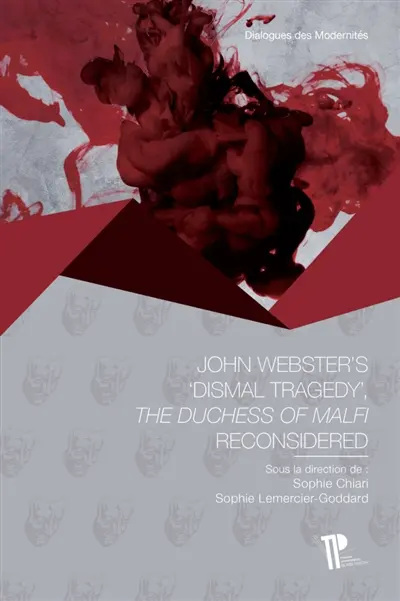en savoir plus

Permet à tous ses détenteurs d'obtenir 5% de réduction sur tous les livres lors du retrait en magasin (réduction non cumulable avec les réductions de type étudiant).
Offre également un certain nombre d'avantages auprès de nos partenaires.
Avec les favoris, retrouvez dans un espace les sélections effectuées au fur et à mesure de vos navigations dans le site.
Constituez pour votre usage personnel vos listes de livres en prévisions d'achats futurs et votre sélection d'articles, dossiers, événements, vidéos ou podcasts préférés ou à découvrir plus tard...
Il suffit simplement de cliquer sur "Ajout Favori" sur chaque page qui vous intéresse pour les retrouver ensuite dans votre espace personnel.
Requiert un compte Mollat
Requiert un compte Mollat
John Webster's dismal tragedy : The duchess of Malfi reconsidered
en savoir plus
Résumé
Des perspectives nouvelles sur la pièce du dramaturge anglais ayant trait à la politique, au genre, à l'esthétique, à la textualité, à la matérialité ou encore à la mise en scène. ©Electre 2026
Quatrième de couverture
Secrets and lies, incest and madness, mental torture and brutal murders, apparitions and lycanthropy : there is little that The Duchess of Malfi, first performed in 1613-1614, shies away from, inflicting on its spectators a whirlwind of conflicting passions and emotions. John Webster's drama has been labelled as baroque, grotesque, mannerist, gothic or feminist. Against Bosola, the figure of the malcontent who also embodies the typical early modern overreacher, the Duchess stands as a symbol of female transgression before she is eventually crushed by evil and male power. Bloody sensationalism should however not eclipse what some critics have seen as a drama of knowledge.
In Delio's concluding speech, Webster's irony is at its peak when he encourages his audience to « make noble use / Of this great ruin » and seems to present the play as a vehicle for moral instruction, defining in a final twist an ethics based on the « integrity of life ». A masterpiece of Jacobean theatre, The Duchess of Malfi reinvents the genre of the revenge tragedy and, beyond its multiple borrowings from other writers, it explores the construction of gender, the class structure of a changing society and the complex interlacing of desire, violence and cruel laughter.
Following the recent inclusion of The Duchess of Malfi in the Agrégation syllabus in France (2019-2020), this volume is meant to provide new perspectives on the play, examining questions relating to politics, gender, aesthetics, textuality, materiality and performance. Its various chapters highlight the richness and incisiveness of the tragedy, reflecting recent critical trends in early modern drama studies.
Fiche Technique
Paru le : 23/05/2019
Thématique : Essais albums sur le théâtre
Auteur(s) : Non précisé.
Éditeur(s) :
Presses universitaires Blaise Pascal
Collection(s) : Dialogue des modernités
Contributeur(s) : Editeur scientifique (ou intellectuel) : Sophie Chiari - Editeur scientifique (ou intellectuel) : Sophie Lemercier-Goddard
Série(s) : Non précisé.
ISBN : 978-2-84516-855-8
EAN13 : 9782845168558
Reliure : Broché
Pages : 353
Hauteur: 24.0 cm / Largeur 16.0 cm
Épaisseur: 2.2 cm
Poids: 630 g

